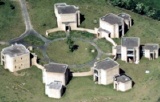From mean-field control to weak KAM dynamics
7-10 May 2012
Organisers: Astrid Hilbert, Vassili Kolokoltsov and Sebastian van Strien
supported by Linnaeus University, Sweden
MINICOURSES BY
Peter E. Caines: ε-Nash Mean Field Games
Bruno Gaujal: Mean field for Markov Decision Processes: from Discrete to Continuous Optimization.
Diogo Aguiar Gomes: An introduction to mean-field games: the finite state space case
Patrick Bernard: Mather theory and applications
Poster (pdf)
Schedule (pdf)
(pdf)
ABSTRACTS:
Patrick Bernard: (Université Paris-Dauphine, Paris) pbernard at ceremade dot dauphine dot fr
(Université Paris-Dauphine, Paris) pbernard at ceremade dot dauphine dot fr
Mather theory and applications
I'll present some elements of Mather and Weak KAM theory, and some applications to the problem of instability in Hamiltonian dynamics, and to the problem of optimal transportation.
Peter E. Caines (McGill University) peterc at cim dot mcgill dot ca
(McGill University) peterc at cim dot mcgill dot ca
ε-Nash Mean Field Games
1. Basic Notions
2. Adaptation and Group Behaviour
3. Major-minor Players and Non-linear Extensions
Multi-agent competitive and cooperative systems occur in a vast range of designed and natural settings such as communication, environmental, epidemiological, transportation and decentralized renewable energy systems. However, the complexity of such large population stochastic dynamic systems make centralized control infeasible.
ε-Nash Mean Field (MF) stochastic control (aka Nash Certainty Equivalence (NCE) control) is inspired by statistical mechanics, the central idea is that for very large population stochastic dynamic games individual feedback strategies exist so that any given agent will be approximately in a Nash equilibrium with the precomputable behaviour of the mass of the other agents.
The (infinite population) Mean Field Game (MFG) equations yield (i) the Nash value of the game for each generic agent, (ii) the best response strategy and (iii) the state distribution of such an agent. The MFG equations have tractable solutions in the linear-quadratic case which give feedback strategies in the for m of a (deterministic) mass feedback combined with a (stochastic) local state feedback; as a result, in the linear-quadratic case, MFG theory yields an ''end run'' around the computational intractability of N player stochastic dynamic games.
In these three talks we shall present (i) the basic notions of ε-Nash Mean Field Games (\epsilon-NMFG) including the linear-quadratic theory, (ii) extensions of ε-NMFG theory to adaptive, egoist-altruist, flocking and coalition seeking behaviours and (iii) the theory of major-minor \epsilon-NMFG agents and developments in non-linear ε-NMFG theory.
Bruno Gaujal (INRIA, France) Bruno dot Gaujal at inria dot fr
(INRIA, France) Bruno dot Gaujal at inria dot fr
Mean field for Markov Decision Processes: from Discrete to Continuous Optimization.
Markov decision processes (MDP) are powerful tools but often suffer from the curse of dimensionality: the complexity of their resolution explodes as the number of objects to be controlled grows. In this talk, I will show that if its drift is Lipschitz then a MDP reduces to a problem of optimal control on an ODE when the number of objects goes to infinity. Several applications of this result will be discussed (in load balancing and in infection dynamics). Finally, I will show that when the drift is not Lipschitz, the Markov process converges to a differential inclusion that can be constructed in closed form. This construction will also be illustrated in several examples pertaining to queueing theory.
This is a joint work with Nicolas Gast and Jean-Yves Le Boudec.
Diogo Aguiar Gomes (Instituto Superior Tecnico, Lisbon) dgomes at math dot ist dot utl dot pt
(Instituto Superior Tecnico, Lisbon) dgomes at math dot ist dot utl dot pt
An introduction to mean-field games: the finite state space case
In this course we will present an introduction to mean field games, a new research area of study introduced by Caines and his co-workers, and, independently, by Lions and Lasry. Mean field games model situations of competition between large number of rational agents that play non-cooperative dynamic games under certain symmetry assumptions.
The first lecture will be an introduction to mean-field models for discrete state problems. We will discuss existence, uniqueness as well as applications of contraction and monotonicity properties.
In the section lecture we will consider N+1 player symmetric games and consider the limit problem as the number of players converges to infinity.
The last lecture will be dedicated to potential mean-field games, as well as various extensions and results for continuous state space problems.
See also:
Mathematics Research Centre
Mathematical Interdisciplinary Research at Warwick (MIR@W)
Past Events
Past Symposia
Where possible, visitors should obtain an EDUROAM account from their own university to enable internet access whilst at Warwick.
You can register for any of the symposia or workshops online. To see which registrations are currently open and to submit a registration, please click hereLink opens in a new window.
Mathematics Research Centre
Zeeman Building
University of Warwick
Coventry CV4 7AL - UK
E-mail:
MRC@warwick.ac.uk

